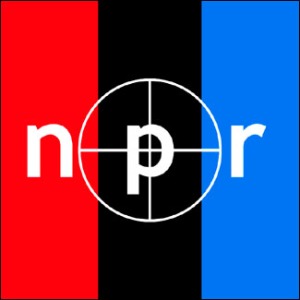
The blogosphere is not the silver liming in the demise of the traditional news media. It's NPR. Without it journalism would be relegated to teabagger guerillas posing as ACORN show-and-clientele. Some of last week's All Things Considered led with the immunization delays that are endangering the lives of Haitian earthquake survivors. Anticipating the gathering storm of post quake outbreaks is not something visual media is equipped or inclined to do.
That's a depth of commitment that outstretches the collective attention spans of every network and cable news network. Instead of following "if it bleeds it leads" NPR positions its news according to whether it resonates it deliberates.
It would seem that so long as coastal education elites are caught in traffic this caliber of reporting will endure. It would figure that the reserve of mostly white mostly liberal mostly guilt could fuel a mad dash of pledge drives in perpetuity. But if there's a blinding sun spot on NPR's horizon it's not the familiar righty complaint of lefty bias. It's the conceit baked into the lonstanding business model that local NPR operators are the judge and jury for what goes out over their audio streams. How aligned are their programming choices with the pulse of their listenership? That's the 900 pound guerilla question. That's the uninvited guest. That's the nagging doubt that we're not quite factoring in "all" things considered.
NPR affiliates fail to announce how well their drives are performing seeded from fears fear of failure (the phones are dead) to trepidations of success (they're over the top so stop yammering on about the Ken Burns gift set already...)
Given NPR's reliance on its "public" it's hard not to feel a slight condescension -- mother ship knows best, standing on pinwheels of sanctimony. My first whiff of imperious NPR came when local Boston affiliate WBUR canned -- first its founder-host Chris Lydon -- and then the show itself. That was a double ouch because the unflappable Dick Gordon was an improvement on his undisciplined and self-referential predecessor.
This kind of cannibalization is another reminder of NPR's largely unrattled cage. On the question of journalistic integrity NPR is largely peerless. It's chief rival is no more Fox News than any frequency on commercial or cable radio. It's NPR itself. Boston can't support two teams in the same sport but now we get to see if can support two public talk radio affiliates. Earlier this winter WGBH quit classical music for the influential pastures of news programming. The results were not auspicious. There was no wellspring of original content but a pick list of every syndicated show not picked up by rival WBUR -- sort of an expansion draft of past prime broadcast-offs.
I can imagine that its hard to grow local talent and original programming takes time to nurture and root. But if WGBH wants to distinguish itself it needs to grow a farm system for cultivating that talent. And I'm hardpressed to think of a more fertile hotbed than the colleges and universities which make higher education the top industry in the very same radio market.


No comments:
Post a Comment